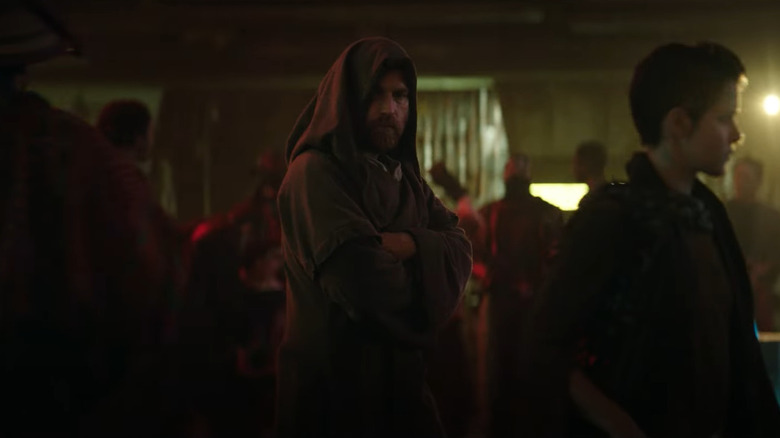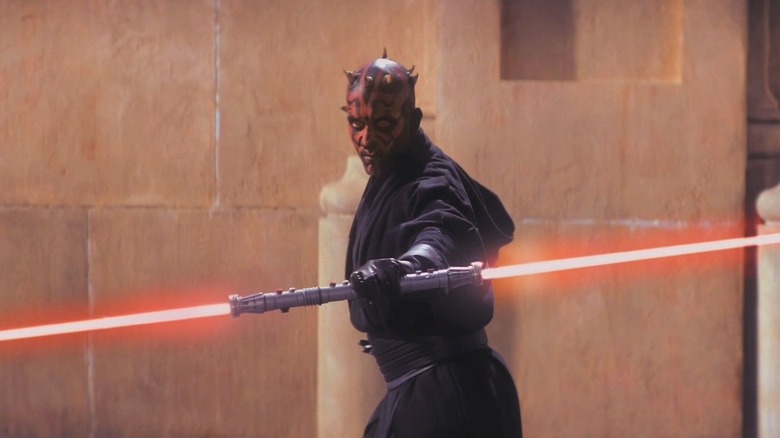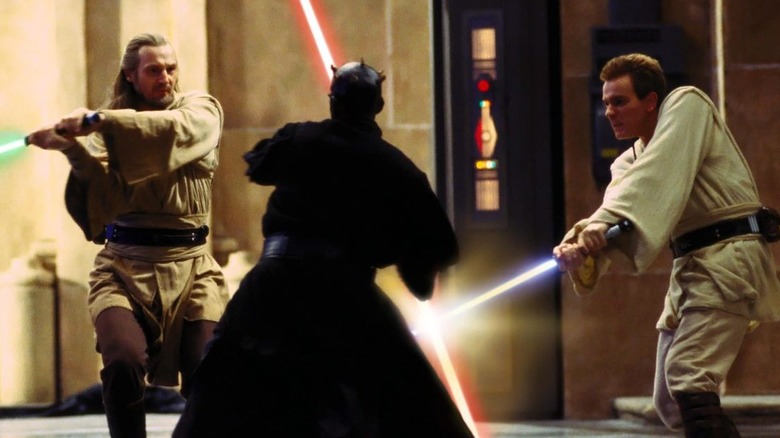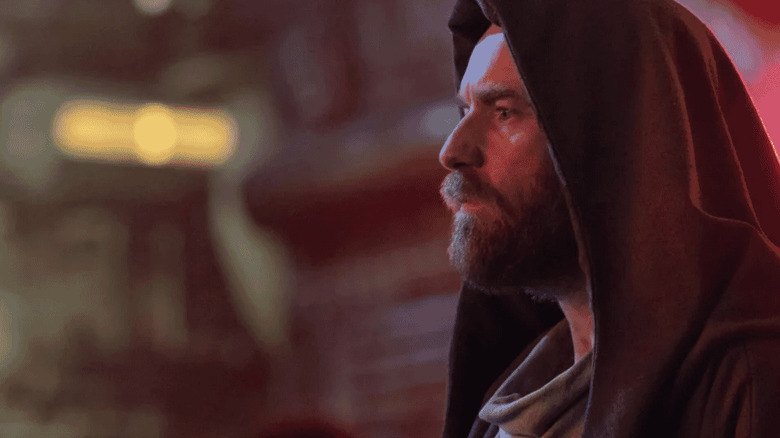The Obi-Wan Kenobi Trailer Reminds Us That Duel Of The Fates Is One Of The Greatest Pieces Of Star Wars Music
John Williams is the greatest living composer on earth. I'm not citing sources to back up that claim, because it's an irrefutable fact. How one human being has managed to generate so many works of musical brilliance that have become not just recognizable, but interwoven into the very fabric of American cinematic culture, is genuinely unbelievable. The music of "Jaws," "Jurassic Park," "E.T. the Extra-Terrestrial," "Harry Potter," "Home Alone," "Close Encounters of the Third Kind," the "Indiana Jones" films, "Superman: The Movie," the 1984 Summer Olympics, "NBC Sunday Night Football," "Catch Me If You Can," and the "Star Wars" films are all genuinely iconic, and this is but a small fraction of the work Williams has created spanning his over half-century career.
Picking a favorite piece of music by John Williams is like asking someone to pick between their children. We shouldn't have favorites, but we totally and absolutely do. As much as I'm a sucker for the roaring strings against the festive winds of "Something in My Memory" from "Home Alone," my favorite piece is and has always been "Duel of the Fates" from "Star Wars Episode I: The Phantom Menace." I was a lowly little eight-year-old choir dork when I went and saw the film in theaters for a birthday party, and the closest thing I'd ever felt to an out of body experience at that age came when Darth Maul flared up his lightsaber, and the London Symphony Orchestra and London Voices pummeled my little ears with the most incredible sound I'd ever heard.
Treating Star Wars like a religious ceremony
John Williams didn't need to go that hard with "Duel of the Fates," but he did that for us because that brilliant maestro wants to rock our collective world with his genius. The "Star Wars" prequel trilogy gets a lot of flak, but it's also home to some of Williams' best musical work in the whole franchise. "Duel of the Fates," in my humble opinion, might be his "Star Wars" magnum opus. Fortunately, I'm not alone. "Look, John Williams knows what he's doing," Dr Dan Golding, a Senior Lecturer in Media at Swinburne, the author of "Star Wars After Lucas," and the host of ABC Classic's Screen Sounds program said.
"Duel of the Fates" is brilliant because it combines both the orchestral work that Williams is known for, with a modernized choral arrangement taking clear inspiration from religious choral work typically reserved for Latin-based liturgy. The chorus absolutely blasts the Sanskrit translation of Welsh poet Cad Goddeu's "Battle of the Trees," a loose translation Williams arranged by ear, modifying syllables so the power of the stanza was prioritized over a perfect Sanskrit pronunciation.
In the special features of the film's DVD, Williams noted that he wanted the lightsaber duel to have a "religious, temple-like feel," and compared the setting of the battle to that of a pagan altar. He said the scene "seems like a dance or a ballet, a religious ceremony of some kind, probably ending in the death of one of the combatants."
Williams brings out the strong emotions
Outside of the outstanding choral work, "Duel of the Fates" contains some of Williams' most interesting orchestral work. The pulsing string ostinato, the bellowing notes of dark brass instruments, the fluttering low woodwinds, and the commanding sound of French horns, all join together to not only allow an absolutely killer score but to also tell a story in tandem with the battle.
Darth Maul's devilish face paired with the choir immediately feels reminiscent of hearing Jerry Goldsmith's "Ave Satani" from "The Omen," the melismatically chanting choir almost serving as a warning siren for the evil in front of our eyes. "Even more than any technical brilliance — which is there, by the way — it's the emotions that Williams captures that is important," said Golding. "His music makes you feel things; never mind the era, the style, the genre." It's a perfect piece of music to embody what director Dave Filoni ("Clone Wars," "Rebels," "Bad Batch," "The Mandalorian") views as one of the most important moments in the entire franchise.
Dave Filoni on the importance of Duel of the Fates in 'The Phantom Menace'pic.twitter.com/0HCpMbryCQ
— Culture Crave 🍿 (@CultureCrave) May 10, 2020
The use of the ostinato (or a repeated sound) invokes a feeling of movement, and tricks our brains into anticipating something big is about to happen. For a contemporary comparison, think about the use of piano in "Clocks" by Coldplay or even the baseline in MC Hammer's "Can't Touch This." We hear it so frequently in the piece that our brain starts to anticipate what could possibly replace it when it finally does stop. Williams also plays with volume dynamics, pushing and pulling the audience through a feverish emotional journey from the soft build of Oboes into the full-on assault of sound at the piece's climax. Try watching Qui-Gon Jinn, Obi-Wan Kenobi, and Darth Maul battle it out on mute ... if your brain isn't immediately playing "Duel of the Fates" inside your head, the fight immediately loses intensity.
Duel of the Fates is why that Obi-Wan Kenobi teaser rules so hard
When Disney+ dropped the highly-anticipated trailer for "Obi-Wan Kenobi," we knew it was going to be cool. But when the Lucasfilm bumper card hit alongside "Duel of the Fates" at the 30 second mark? CHILLS. In less than two minutes, that teaser trailer kicked us square in the chest with "Battle of the Heroes," "Duel of the Fates," "Anakin's Dark Deed," and "The Force Theme." Knowing that John Williams returned for the "Obi-Wan Kenobi" series is even more exciting, because there's no way that Williams isn't going to return to the musical themes established in the prequels, and given a fresh bump of creativity.
Even today, "Duel of the Fates" is John Williams most streamed piece of music on Spotify*, and is the only classical piece of music to ever appear on MTV's "Total Request Live" (god, I'm old). Obviously, the "Star Wars Main Theme" and "The Imperial March" are absolutely iconic pieces of music that all of us will remember the tune to even after our brains have deteriorated into mush and leaking out of our ears, but "Duel of the Fates" will forever hit in a way that few pieces of music can. John Williams truly is the man.
*Technically his arrangement of "Carol of the Bells" from "Home Alone" is his most streamed track, but that's a classic Christmas song from 1914, not a Williams original.



